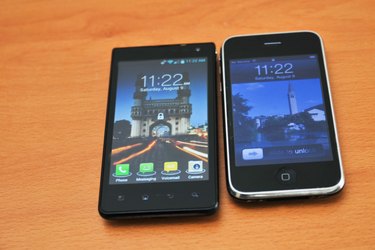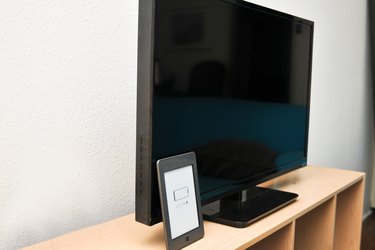
If you've ever used a smartphone, tablet or touch screen computer, you've likely used a Thin Film Transistor touch screen. A TFT touch screen is a combination device that includes a TFT LCD display and a touch technology overlay on the screen. The device can both display content and act as an interface device for whoever is using it. TFTs make up the lion's share of touch screens, with Organic Light Emitting Diode screens being the only other major competitor.
About TFT Screens
Video of the Day

TFTs, also called TFT screens, are a type of active matrix LCD display capable of displaying millions of high-contrast, clear and bright color pixels. TFTs are used in HDTV sets, computer monitors, laptop monitors, tablets, personal media players, smartphones and even feature phones. The first TFT screen came with the IBM ThinkPad's 1992 model. The TFT technology works by controlling brightness in red, green and blue sub-pixels through transistors for each pixel on the screen. The pixels themselves do not produce light; instead, the screen uses a backlight for illumination. The TFT family also includes LEDs, which are a type of LCD screen that uses an LED as a backlight.
Video of the Day
About Touch Screens

Touch screens are a type of overlay placed on a display screen used to register touch interaction on the screen. Touch screens are not a type of display, but rather a component that can be added to an existing screen. Touch screens use two different methods to register touch interaction called "resistive" and "capacitive," which refer to pressure and touch sensitivity respectively. Resistive screens work by measuring voltage differences caused by finger or stylus pressure on the screen, whereas capacitive screens work by measuring current interruption.
Together Our Powers Combine

TFT touch screens use both the TFT and touch screen technologies together to create a touch-based interface overlay on a thin, lightweight display. Touch screens were in use before TFT LCD dominated the large display market and formerly existed as overlays for CRT screens. However, CRT screens require a much larger footprint and weigh several times more for the same screen space as LCD screens. Combining touch screens with TFT displays helped make the concept practical and affordable.
Other Display Types

Many device types that use TFT touch screens feature models that use the competing OLED technology. For example, the Samsung Galaxy S5 smartphone and PlayStation Vita handheld gaming machine both feature OLED screens. Compared to TFT, OLED touch screens have a wider viewing angle. Additionally, OLED touch screens do not need backlights and can be displayed transparently, allowing the devices to be thinner and work as heads-up displays.
- PC Magazine Encyclopedia: Definition of: LCD Types
- PC Magazine Encyclopedia: Definition of: OLED
- PC Magazine Encyclopedia: Definition of: Touch Screen
- Computer Hope Jargon: Active Matrix Display
- PC Magazine Encyclopedia: Definition of: TFT
- PC Magazine Encyclopedia: Definition of: LED
- GSM Arena Glossary: Display Type
- Extreme Tech: OLED Finally Triumphant: The Galaxy S5 has the Best Smartphone Display on the Market
- Playstation.com PS Vita Overview: OLED Display Brightens the PlayStation Vita System Game Worlds